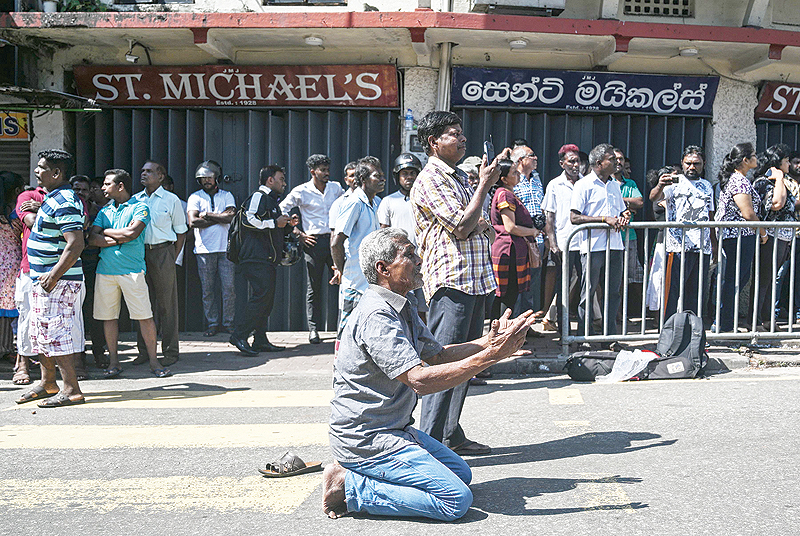COLOMBO: Sri Lanka said yesterday it believed a local Islamist extremist group was behind deadly suicide bomb blasts that killed nearly 300 people, as it ordered a national state of emergency beginning midnight. Government spokesman Rajitha Senaratne said investigators were looking at whether the National Thowheeth Jama’ath (NTJ) group had “international support” for the deadly Easter Sunday attacks on churches and luxury hotels. So far, 24 people have been arrested in connection with the attacks, but no details have been given about them.
Little is known about the NTJ, but documents seen by AFP show Sri Lanka’s police chief issued a warning on April 11, saying a “foreign intelligence agency” had reported the group was planning attacks on churches and the Indian high commission. The group has previously only been linked to vandalizing Buddhist statues. “We don’t see that only a small organization in this country can do all that,” said Senaratne of the deadly attacks. “We are now investigating the international support for them, and their other links… how they produced the suicide bombers here, and how they produced bombs like this.”
The death toll from Sunday’s attacks rose dramatically Monday to 290 – including dozens of foreigners - in the worst atrocity since the country’s civil war ended a decade ago. More than 500 people were injured in the assault that saw suicide bombers hit three high-end hotels popular with foreign tourists, and three churches, unleashing carnage in Colombo and beyond. Two additional blasts were triggered as security forces carried out raids searching for suspects. Tensions remained high yesterday, with a bomb detonating as police prepared to defuse it near one of the churches targeted a day earlier. No injuries were reported. Police also found 87 bomb detonators at a Colombo bus station. A home-made bomb was also defused at Colombo airport late Sunday.
President Maithripala Sirisena’s office said a state of emergency “limited to counter terrorism regulations only” would be introduced from midnight yesterday (1830 GMT). “This is being done to allow the police and the three forces to ensure public security,” the statement said, referring to the army, navy and air force. Officials said Sirisena would ask diplomats for help investigating the blasts. “The intelligence sections have reported that there are international terror groups which are behind the local terrorists,” the statement said.
US President Donald Trump called Prime Minister Ranil Wickremesinghe to pledge US support in bringing the perpetrators to justice, a White House spokesman said. “A terrible, terrible thing. Unthinkable,” Trump later told reporters at a White House event. “We are working with Sri Lanka.” Interpol said it was deploying a team of investigators to Sri Lanka, and US Secretary of State Mike Pompeo said he had spoken to Wickremesinghe. “This is America’s fight, too,” Pompeo said. A new curfew was in place from 8:00 pm (1430 GMT) yesterday until 4:00 am today, and the US State Department warned of possible further attacks in a travel advisory update.
The attacks were the worst ever against Sri Lanka’s small Christian minority, who make up just seven percent of the 21 million population. At least 37 foreigners were among the dead, including citizens of India, Britain, Turkey, Australia, Japan and Portugal, as well as a dual US-British passport holder. Denmark’s richest man Anders Holch Povlsen and his wife lost three of their four children in the attacks, a spokesman for his fashion firm said. Ethnic and religious violence has plagued Sri Lanka for decades, with a 37-year conflict with Tamil rebels followed by an upswing in recent years in clashes between the Buddhist majority and Muslims.
The churches targeted included St Sebastian’s in Negombo, north of the capital, which was surrounded by security forces yesterday. Dozens of people were killed at the church, including friends of 16-year-old Primasha Fernando, who was at her home nearby when the suicide bomber struck. “When I got to the church there were people crying and screaming,” she told AFP. “I saw bodies everywhere,” she added in tears. “I saw parents carrying their dead babies. I saw dead people who had hair but didn’t have faces anymore.”
The Negombo attack appeared to have been the deadliest of the six, with 102 bodies in total at the town’s general hospital, health officials said. At a government morgue in Colombo, relatives yesterday endured the gruesome task of identifying their loved ones. Eighteen bodies were released after relatives recognized victims from video clips shown on a screen in a corner of the morgue courtyard. Janaka Shaktivel, 28, father of an 18-month-old son, sat in shock outside the building waiting for the body of his wife to be handed over. “I recognized her body from the wedding ring that she always wore,” he said. “I have no words to explain my feelings.”
Two leading Muslim groups issued statements condemning the attacks, with the All Ceylon Jamiyaathuul Ulama, a council of Muslim theologians, urging the “maximum punishment for everyone involved in these dastardly acts”. For many, the blasts stirred painful memories of Sri Lanka’s civil war, when bomb attacks were a frequent occurrence. – Agencies











